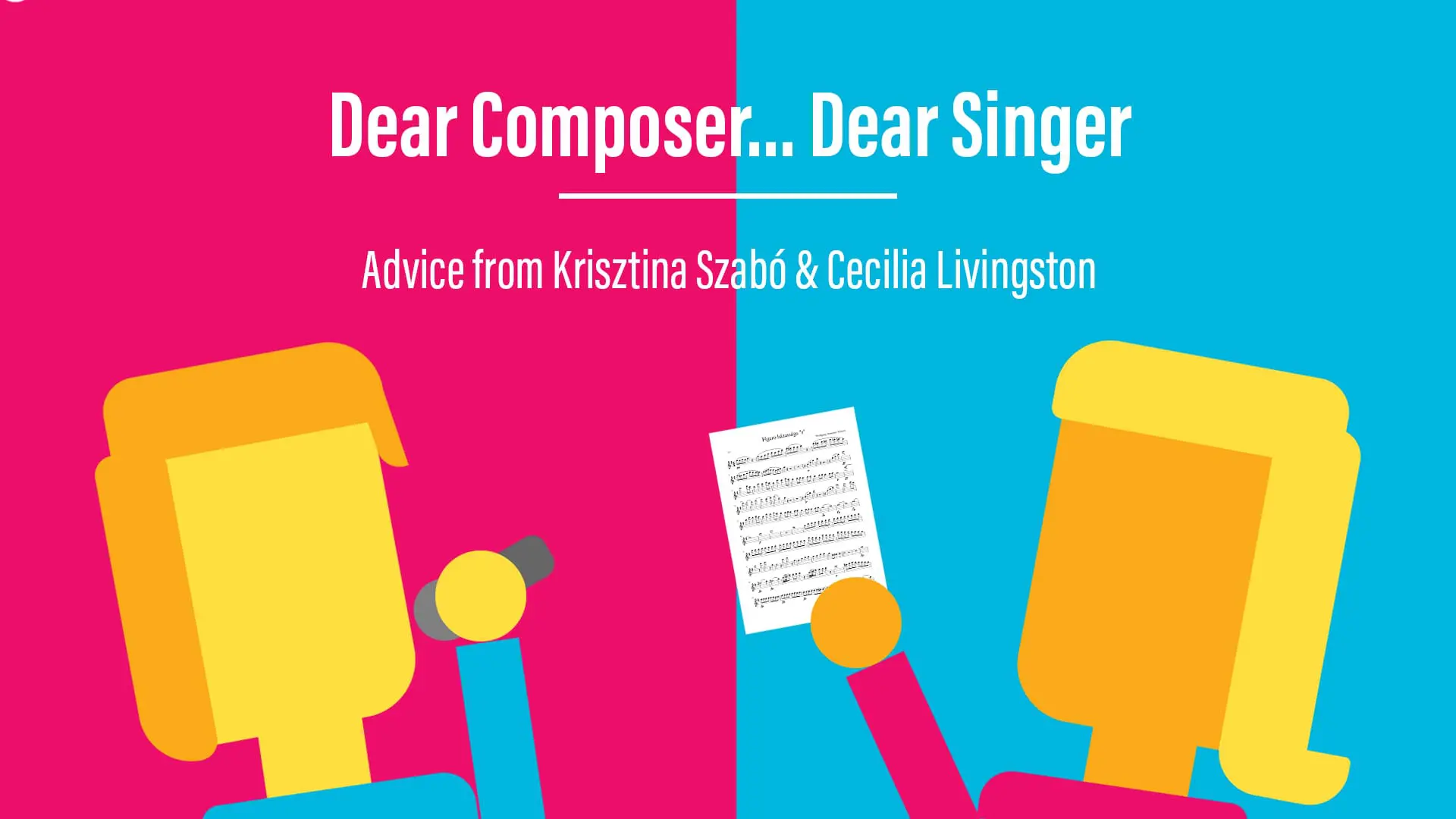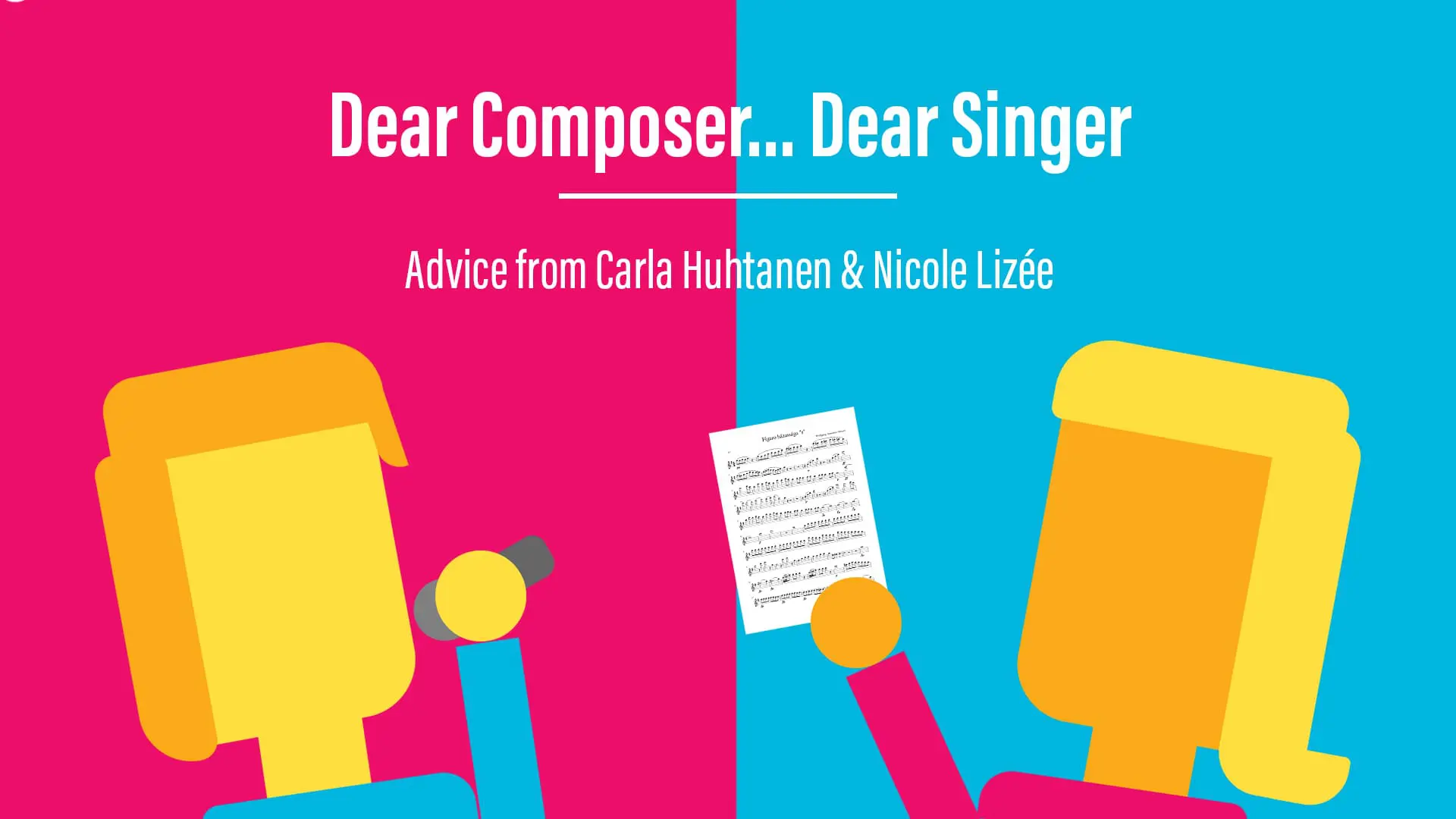In our latest instalment of our advice series, “Dear composer…dear singer”, we’re focusing on the words of Canadian composer James Rolfe. What kind of singer does a composer love to work with? How can singers offer feedback? Should composers sing? Rolfe has the answers:
“I’ve been fortunate to work with excellent singers who, with little or no coaching from me, have sung my music with excellent results. I feel reluctant to blunder in with helpful advice—but here I am, blundering away.
“No-one wants to hear a singer struggling to navigate their part. Listeners are drawn to singers who make it sound easy (even if making it sound easy is almost always the result of hard work, for both singers and composers). But no composer always manages to stay out of the way of the singer, so singers shouldn’t be afraid to offer specific feedback. Places where it’s difficult to project the words—too much text too fast, awkward rhythms, hard-to-tune intervals or harmonies, registers too high or too low—are commonplace, even with experienced vocal composers. Passages or entire parts may lie too high or too low. (It’s fair to ask a composer if it’s feasible to transpose them, even by a small interval.) A vocal part may be so busy that the singer is overtaxed to the point of diminishing returns—which almost guarantees that the listener will also have a hard time digesting it.
“A composer loves working with a singer who knows their own voice, and who is able to give respectful and constructive feedback about anything that feels amiss—things that a composer might never find out unless the singer tells them. Try not to offer alternate solutions at first, no matter how tempting it may be, unless the composer asks directly for them. There are usually reasons that the composer wrote the notes they wrote; it may take you time to understand their expressive intentions, by which point the composer may have come up with a solution of which they can take ownership. It may be that the difficulties are expressively and musically justified, in which case the singer will just need to learn the piece as best they can, and trust that the composer’s intentions are sound.
“So much of composing is about being clear: clear in your notation, and also in your artistic intentions.”
“Really, the advice I’d prefer to offer is aimed at fellow composers. Always try to sing what you’ve written, even in your croaky composer voice, to piano or Midi accompaniment. If you can’t manage, that’s not a good sign. Does it need to be so high or so low, so fast, so busy, so jumpy? Can you find your pitches, or are they unsupported? Can we hear the words? The singer often must memorize their part, which can be a mammoth job if it’s an entire opera—have you made their job harder than it needs to be? And if you do want to push the singer, do you have an expressive reason to do so? A good singer often makes up their own story to make their part come alive, and if a difficult passage has some expressive angle they can latch onto, that can make their job a lot easier. The composer may need to suggest an angle or two in case the singer is at a loss. So much of composing is about being clear: clear in your notation, and also in your artistic intentions.
“A good singer will make the composer’s music come alive in ways the composer might never have dreamed possible.”
“There are as many different voices as there are singers, each with their own registers, colours, strengths, quirks. Singers are humans, and can be very vulnerable: they may struggle with confidence or health, have good days and bad, lapses of memory or focus. They will aim to sing all the right notes, but it’s unhelpful and unrealistic for composers to expect the kind of note-perfect renderings that they may expect of instrumentalists. A singer entrusts their voice to your music: this is not to be taken for granted! A composer needs to be mindful that they are asking a singer to undertake something very intimate and revealing, something which demands great courage and skill and trust, something which might harm the singer physically or emotionally if the composer is unaware.
“For all these reasons, it’s very important for the composer to get their score to the singer as far in advance of the performance as possible. I’d suggest at least a month for something not too difficult, and two months or more for bigger pieces. A last-minute piece does no favours to either singer or composer. A singer needs to be kind but firm about deadlines.
“When things do go right, though, the singer-composer relationship can’t be beat. A good singer will make the composer’s music come alive in ways the composer might never have dreamed possible, and a sensitive composer will take the singer places they may never have imagined finding in themselves. Words and music are so elemental, so primal, that when it goes well, the results are larger than life: singer, composer, writer, and listener are bonded together, creating the kind of connection that will not soon be forgotten.”
Readers, which composers and singers do you hope to see included in our “Dear composer…Dear singer” advice series? Let us know in the comments, or get in touch at outreach@operacanada.ca.















